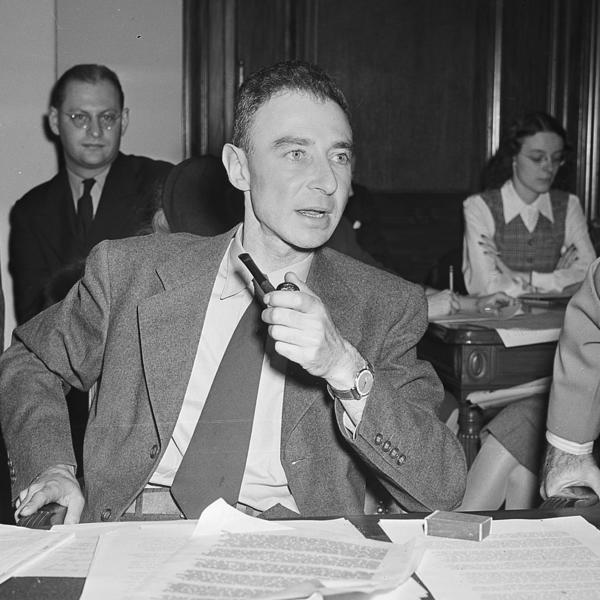Cullan McHugh ‘26 sat up in his seat as the flash of light filled the theater’s enormous screen. The scene from the blockbuster hit movie “Oppenheimer” depicted the United States dropping a nuclear bomb on Japan in World War II and brought to life what McHugh had studied all summer.
“Watching the movie, it seems like they’re working toward this great bomb that’s going to end the war. And we’re taught that, basically, the war ended after they used the nuke,” McHugh said. “But when you’re sitting there and you see the bomb go off, and you see the light and then there’s the jumpscare with the big boom, then it all starts to hit you.”
McHugh worked with Holy Cross political science professor Daniel Klinghard last summer to examine how science has influenced the American government. The overlap between science, politics and government began in many ways through the Manhattan Project and the creation of a nuclear weapon.
The bombs represented the newest technology in the world. After they were dropped and killed hundreds of thousands of people, the public grappled with the aftermath as science began to overlap with morality and society. J. Robert Oppenheimer, the lead physicist on the Manhattan Project, once hailed as a hero, began to be viewed as a villain, and a movement began in the United States that questioned the role of science and government. The public, including many scientists who worked on the project, began to ponder technological oversight.
“It leads to the anti-war movement and the anti-nuclear movement, but it also leads to a deeper argument about how the government should direct science in a socially responsible way,” Klinghard said. “In that sense, I think you see awareness of social implications for things like nuclear energy and nuclear weapons, but also pollution and environmental decay. In a lot of ways, that leads us to this moment that we’re in now.”
The social movement led to the creation of several oversight committees, including the Office of Technology Assessment (OTA). Operated within Congress, the office was created in 1974 and continued through 1995 with a mission to examine issues involving new or expanding technologies, assess their impacts and analyze alternative policies to avert crises.
Congress cut the office in 1995. There have been several attempts to resurrect it. Technically, it still exists on the books – it just needs funding.
While McHugh watched “Oppenheimer,” many of the faceless people he read in research texts came to life. They smiled, loved their families and struggled with the consequences of their and others’ actions.
“When researching scientists, you read about all these remarkable things they’ve done and all these influential positions they’ve held, but you never really learn about their character or what they looked like,” McHugh said. “It was fascinating to see Oppenheimer, or Isidor Rabi was another, who had these great and interesting personalities, which isn’t captured in textbooks or Wikipedia.”
They’re geniuses but also humans, McHugh said, which history can often forget or overlook. For so many the research became their identities and defined their lives. Klinghard pointed to Robert Downey Jr.’s character in the movie, Lewis Strauss, who has a revelation that some within the Manhattan Project may be unable to view the research with an unbiased lens.
“I’m paraphrasing, but he says, Oppenheimer is compromised because the bomb is so close to his career, to his trajectory, to his name, that he couldn’t have pulled back. He couldn’t say, ‘We shouldn’t do this,’” Klinghard said.
The OTA was created to have some separation between scientist and cause and develop an informational committee that would provide elected officials with information to make decisions separate from research.
Klinghard said many of the scientists who worked indirectly on creating the nuclear bomb believed in the idea of technology assessment.



